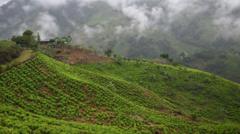In a worrying escalation of hostilities, 57 Colombian soldiers have been kidnapped by local civilians in the volatile Micay Canyon, an area notorious for its role in cocaine production and ongoing insurgent activities. The military attributes the abductions to pressure from dissidents of the Farc rebel group.
Tensions Escalate in Colombia as Soldiers Taken Hostage by Civilians

Tensions Escalate in Colombia as Soldiers Taken Hostage by Civilians
Over 50 military personnel are kidnapped in the Micay Canyon, highlighting ongoing conflict and the ongoing struggle with cocaine production.
In a dramatic turn of events in Colombia's southern Micay Canyon, the military has confirmed that 57 soldiers were taken hostage by a large group of civilians responding to the actions of local dissidents. Of these soldiers, 31 were snatched on Saturday, followed by another group the next day, totaling over 200 civilians involved in the operation. This mountainous region is notorious for its key role in cocaine production amidst the nation's longstanding struggle with rebel factions.
Brig Gen Federico Alberto Mejía, addressing the situation, labeled the actions as "kidnapping" in a social media statement. Preliminary reports point to the involvement of the EMC rebel group, a significant splinter of the former Farc, which officially signed a peace agreement with the Colombian government in 2016. Officials suspect that the abductions may have been orchestrated in retaliation against military operations after local authorities captured a suspected EMC member.
As the military attempted to evacuate the detainee, they found themselves encircled by a hostile crowd, leading to the capture of a second group of soldiers when a larger mob descended onto them a day later. The Colombian military has indicated that efforts are underway to negotiate a peaceful release for all personnel now being held in a singular location.
The Micay Canyon has been a hotspot for the transportation of cocaine to coastal ports, enabling the illegal drug trade to thrive. The Colombian military, which has maintained a presence in the area since October, has emphasized that the local populace predominantly relies on coca cultivation for their livelihoods. General Rodríguez emphasized the perception that military presence threatens the lucrative cocaine market, underscoring the complex dynamics between law enforcement and local communities entrenched in the drug economy. Under President Gustavo Petro's administration, while peace talks with the EMC have taken place, the divide fostered by their former leader, Iván Mordisco, continues to perpetuate violence and instability in the region.




















